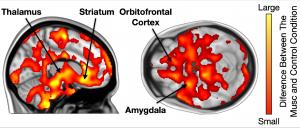Favorite music sets the brain's opioids in motion
Listening to favorite music affects the function of the brain’s opioid system.
Music can evoke intense pleasure, sometimes experienced physically as pleasant “chills.” While the effect of music on pleasure is clear, the brain mechanisms behind musical enjoyment are not yet fully understood. The brain's opioid system is known to be involved in pleasurable experiences related to survival-critical behaviors, such as eating and sex. This new study from the Turku PET Centre in Finland demonstrates for the first time that listening to favorite music also activates the brain’s opioid receptors.
The study measured the release of opioids in the brain using positron emission tomography (PET) while participants listened to their favorite music. Additionally, functional magnetic resonance imaging (fMRI) was used to examine how the density of opioid receptors affects brain activation when listening to music.
The results show that favorite music influenced opioid release in several brain areas associated with the experience of pleasure. The release of opioids was also linked to how often participants reported experiencing pleasurable chills while listening to music. Furthermore, individual differences in the number of opioid receptors correlated with brain activation during music listening: the more opioid receptors participants had, the more strongly their brains reacted in MRI scans.
“These results show for the first time directly that listening to music activates the brain’s opioid system. The release of opioids explains why music can produce such strong feelings of pleasure, even though it is not a primary reward necessary for survival or reproduction, like food or sexual pleasure,” says Academy Research Fellow Vesa Putkinen from the University of Turku.
Professor Lauri Nummenmaa adds: “The brain’s opioid system is also involved in pain relief. Based on our findings, the previously observed pain-relieving effects of music may be due to music-induced opioid responses in the brain.”
The study provides significant new insight into how the brain’s chemical systems regulate the pleasure derived from music. The results may also help develop new music-based interventions, for example, in pain management and the treatment of mental health disorders.
The research article "Pleasurable music activates cerebral µ-opioid receptors: a combined PET-fMRI study" was published in the European Journal of Nuclear Medicine on 4 April 2025.
Academy Research Fellow Vesa Putkinen
University of Turku
vesa.putkinen@utu.fi
Legal Disclaimer:
EIN Presswire provides this news content "as is" without warranty of any kind. We do not accept any responsibility or liability for the accuracy, content, images, videos, licenses, completeness, legality, or reliability of the information contained in this article. If you have any complaints or copyright issues related to this article, kindly contact the author above.
Revolutionary Garage Door Price Calculator by Firstline Garage Door Repair
Non-invasive Surgical Wound Closure Market Growth at 4.1% CAGR
Reflective Air Packaging Market to Surpass USD 15,089.37 Million by 2035, Driven by Thermal Protection Needs | FMI
Kalendarium
Więcej ważnych informacji
 Jedynka Newserii
Jedynka Newserii

 Jedynka Newserii
Jedynka Newserii

Transport

Import materiałów budowlanych z Rosji zagrożeniem dla konkurencyjności europejskiego rynku. Konieczne są zmiany i egzekwowanie sankcji
Unia Europejska powinna zrewidować politykę celną na import materiałów budowlanych spoza państw członkowskich, w tym państw wschodnich – twierdzą uczestnicy konferencji „Bezpieczeństwo gospodarcze UE”. Obecnie Wspólnota nakłada na europejskich producentów coraz więcej ograniczeń, nie rewidując polityki celnej, co przekłada się na systematyczne osłabienie konkurencyjności przedsiębiorstw, spadek produkcji i zagrożenie dla miejsc pracy.
Konsument
Polacy odczuwają brak wiedzy na temat inwestowania. Może to sprzyjać podejmowaniu nieracjonalnych decyzji finansowych

Co trzeci Polak odczuwa brak wiedzy w obszarze inwestowania, a tylko co piąty chciałby pogłębić swoją wiedzę na ten temat – wynika z badania „Poziom wiedzy finansowej Polaków 2025”. Ci, którzy na własną rękę szukają informacji i porad, coraz częściej sięgają do blogów, portali, podcastów i wideo w internecie. Eksperci przestrzegają, że finansowych i inwestycyjnych porad udzielają nie tylko specjaliści w danej dziedzinie, więc potrzebna jest zasada ograniczonego zaufania.
Handel
Do 2030 roku liczba plastikowych opakowań w e-handlu modowym może się podwoić. Ich udział najszybciej rośnie w Polsce

Wraz ze wzrostem kanału e-commerce w branży modowej rośnie liczba wykorzystywanych opakowań, z których znaczną część wciąż stanowią te z plastiku. Do 2030 roku w Polsce e-sprzedawcy zużyją 147 mln plastikowych opakowań – wynika z badania przeprowadzonego na zlecenie DS Smith. Można zauważyć rosnący trend wśród marek modowych, które coraz częściej wybierają opakowania wykonane z papieru lub materiałów z recyklingu. To o tyle istotne, że polscy konsumenci odczuwają wyrzuty sumienia z powodu ilości plastiku, w którym dostarczane są ich zamówienia.
Partner serwisu
Szkolenia

Akademia Newserii
Akademia Newserii to projekt, w ramach którego najlepsi polscy dziennikarze biznesowi, giełdowi oraz lifestylowi, a także szkoleniowcy z wieloletnim doświadczeniem dzielą się swoją wiedzą nt. pracy z mediami.









.gif)

 |
| |
| |
|